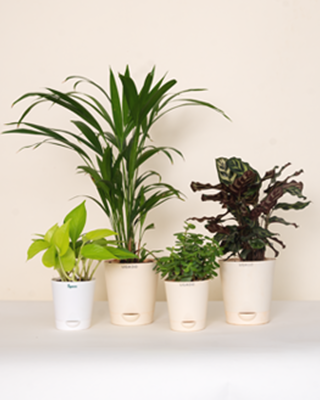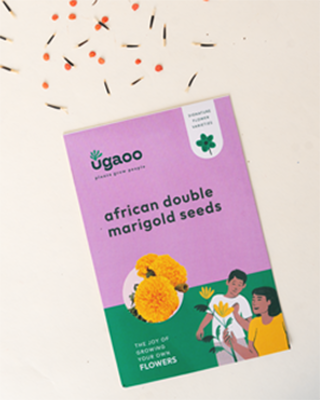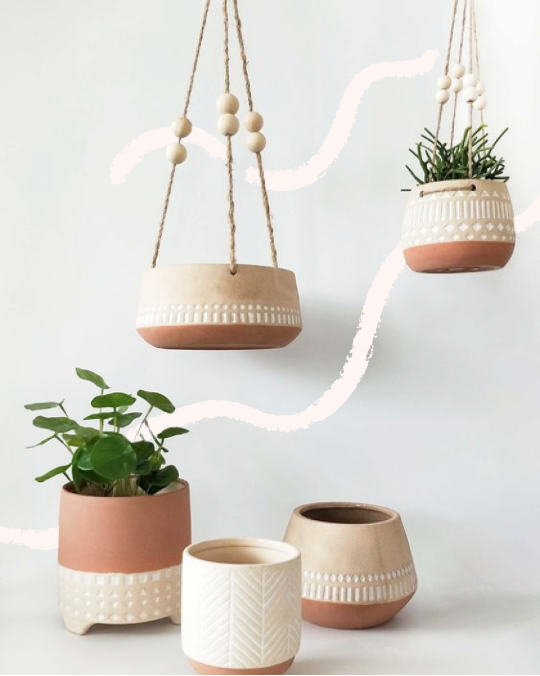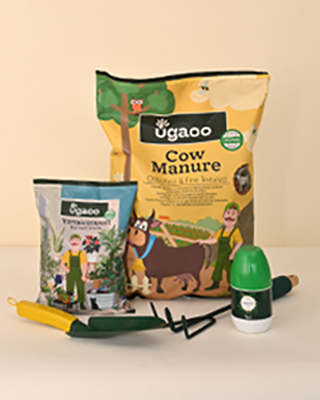• Gardening Tips to Prepare for Rainy Season
1. Rain Garden Design - Draw your Garden Plan

Whether you're growing vegetables or other garden plants with ornamental values, picture what you would want your garden to look like. Visualize all home garden features that you desire & draw a rough garden plan on paper for a better perspective. Locate your plants appropriately according to available space & sunlight. Mostly your lawn, flowering plants, and fruiting vegetables should be growing in the sunniest part of the garden.
2. Rain Cover for Garden

Extensive rains can hamper and spoil your home garden entirely. So, one of the most important garden maintenance tips is - to prevent your plants from being affected by the heavy rain, you can purchase or make a rain cover for your gorgeous garden plants, particularly for houseplants. Keep your indoor plants and succulents away from direct rainfall. Provide strong wooden stake support to young tree saplings planted outdoors.
3. Drainage for Garden
Drainage is of vital importance in every garden. It is a way of ensuring that the soil is properly aerated as excess water can choke your crops. With proper drainage, the soil and nutrient can be reduced, and soil erosion can be avoided. Use proper drainage cells for terrace monsoon gardening. If planned intelligently the wastewater can be collected and saved for future use. It influences both plant growth and soil conditions.
4. Keep the Pits Ready for your Monsoon Plants

If you plan to plant new fruiting tree saplings like Mango, Guava, Chiku, Coconut, etc., this is the right season. To create the perfect monsoon garden, dig the pits for your tree saplings before the rains arrive. Fill up the pits with good quality soil & manure mixture. 1 x 1 x 1 m is average pit size for all types of fruiting and ornamental trees with little variations. Make sure you select right ‘varieties’ of fruiting trees from trustworthy nursery source. Additionally, make small size pits for flowering shrubs like Hibiscus, Roses, Ixora, Mussaenda, etc.
5. Collect & Store it Now
Another important monsoon gardening tip is material storage. The following material should be collected and safely stored at your home garden for the successful gardening season ahead:
5.1 New Pots

The three primary factors to be considered before purchasing a container are drainage, porosity and weight. Secondly, keep in mind aesthetics i.e. color, shape, size, and ornamental value of the pot you are about to select. Also, consider cost & time, is the container material safe for your edible plants, how much maintenance would these pots need and how good is their durability. While selecting a new pot for your plants in monsoon season, do keep a tab on Insulation properties and ease of portability as you might need to shift your pots indoors occasionally.
Buy Pots and Planters
5.2 Rain garden plants

For rain gardens, always select garden plants with deep and fibrous roots as they absorb rainwater efficiently. It is advisable to have natives or native cultivars in a rain garden because these plants adapt best to a locality. However, you can also choose non-invasive, ornamental horticultural plants. In your garden design do allocate space for herbaceous perennials, woody trees and shrubs. Some of the best plants to grow in monsoon in India for rain gardens are the Indian Blanket Flower, Indian Bee Balm, and certain grasses.
5.3 Gardening tools
Buy the Outdoor Gardening Kit
For proper garden maintenance, select the right tools that will be required for the new gardening season for digging, pruning, trimming, raking, weeding, etc.
5.4 Seeds
All vegetables & monsoon flowering plants are grown by seeds only. The quality of your garden is directly dependent on the quality of seeds you sow, so, select the best quality seeds for rocking gardening season.
Buy seeds
5.5 Garden Soil

Select the best kind of garden soil. The ideal garden soil is the one with good water holding capacity, humus content, and well-drained soil. You can also select the perfect ready made potting mixtures.
5.6 Organic Manure
Garden soil & pot mixture is incomplete without added organic fertilizer. Whether it's compost, cow manure, leaf mould or Vermicompost.Happy gardening!















